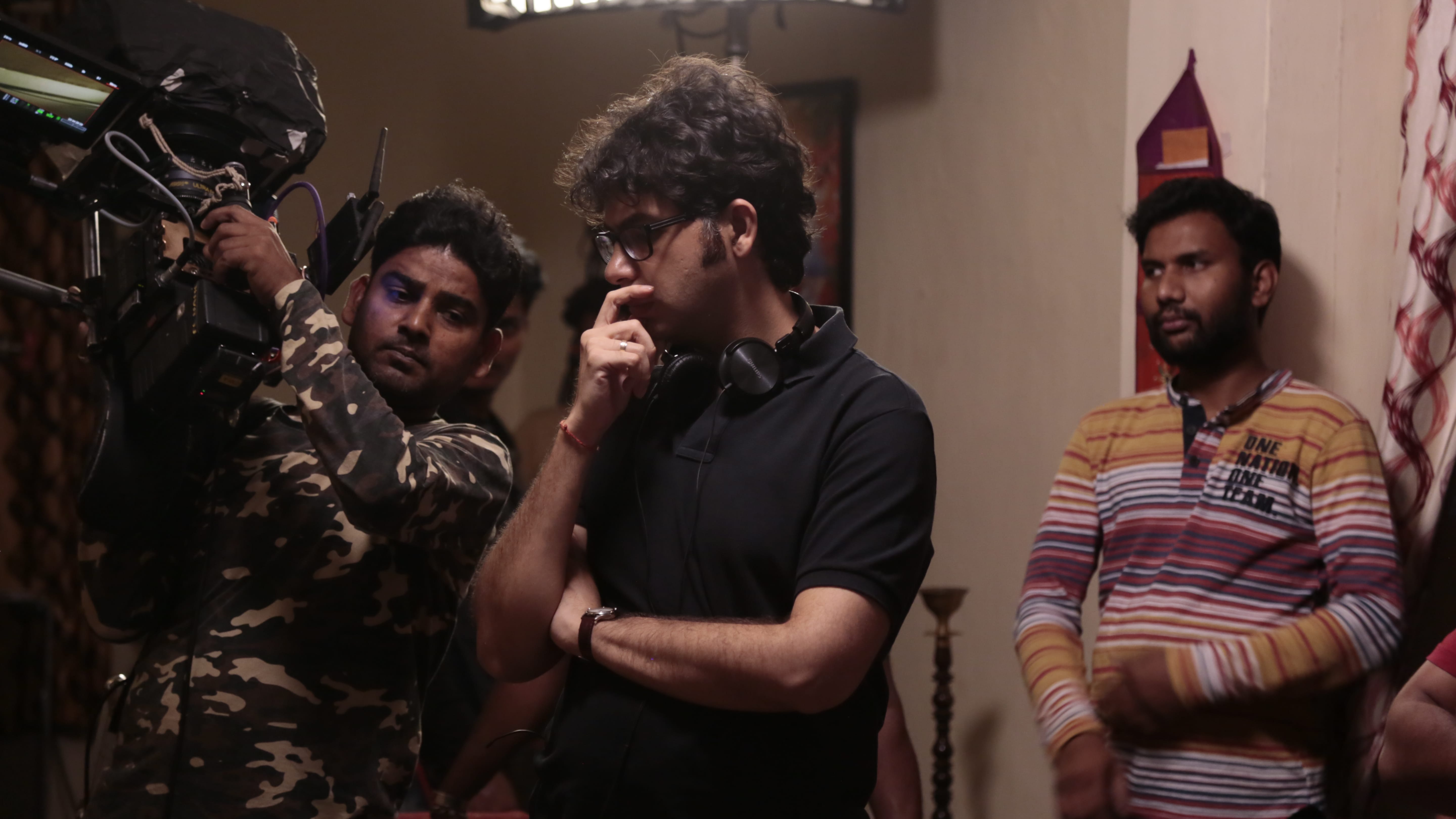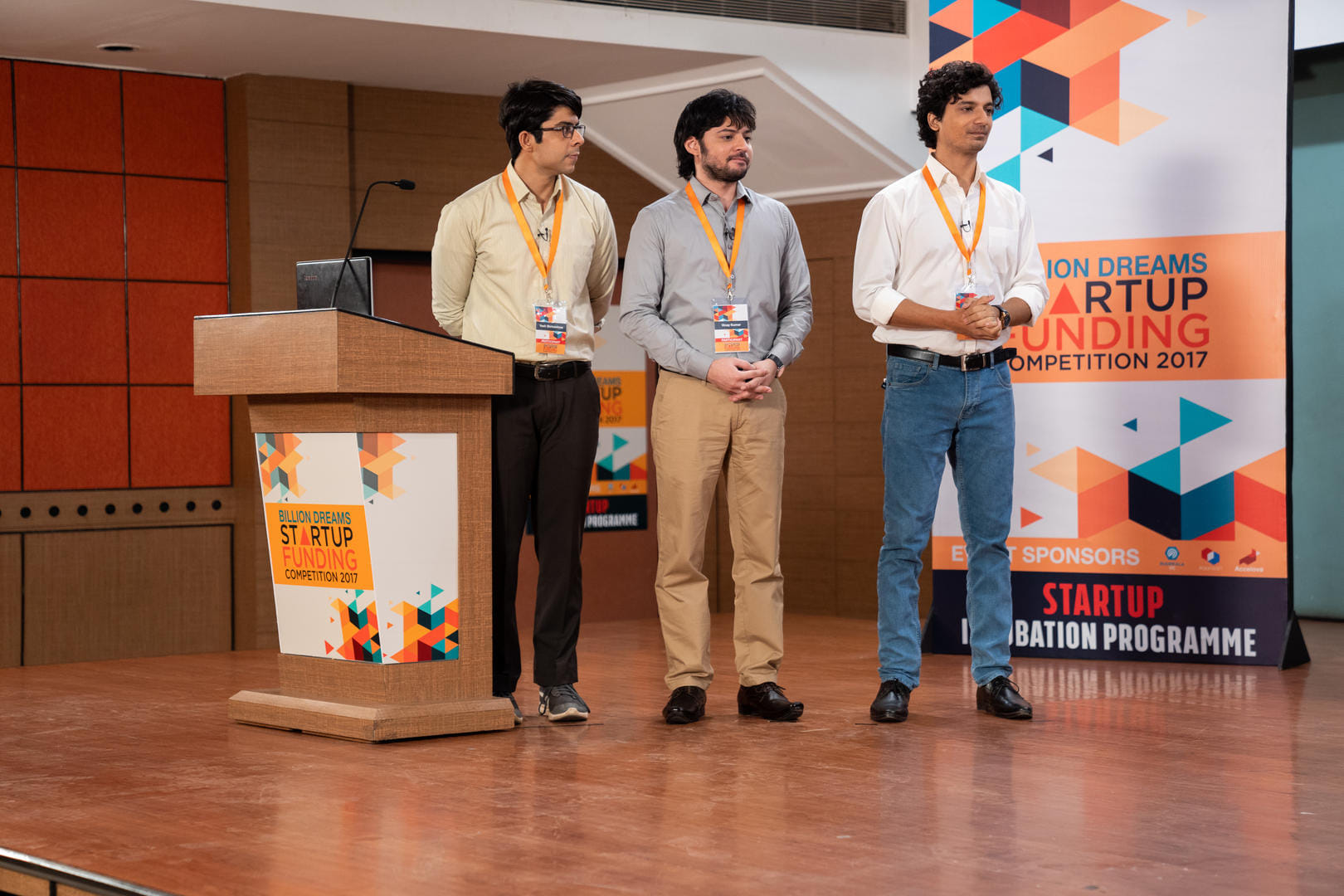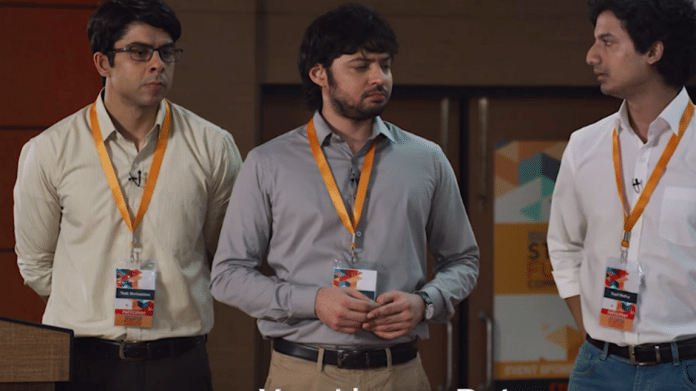New Delhi: This Friday will see the worldwide release of Upstarts, a Netflix Original Film set in the world of Indian startups. India has seen a few films about the entrepreneurial spirit (Rocket Singh: Salesman of the Year, Band Baaja Baaraat) and a TVF web series called Pitchers, but this is the first time a full-length feature film will really dig deep into the tech startup ecosystem in India as we know it.
But debutant director and co-writer Udai Singh Pawar, who has earlier worked on films such as Raja Krishna Menon’s Airlift and Sudhir Mishra’s Inkaar and Yeh Saali Zindagi, is clear that Upstarts is not about engineering and coding. He tells ThePrint that it is, above all, a movie about friendship, about the very human desire to do something that makes a difference, about the balance between success and integrity.
The geek shall inherit the earth
The film, produced by Menon and Janani Ravichandran’s Bandra West Pictures, is about three small-town boys, engineering college graduates who decide to set up their own social enterprise and how they manage the delicate balance between work and friendship. It also provides perspective on an aspect of India’s growth story that has not really been documented in popular culture.
The joy of coming up with a unique idea, the pain of rejection by potential funders, the bootstrapped existence, the knowledge that failure is almost certain, the rush of joy when an idea takes off and the hubris that creeps in with success — Pawar knows these well.

An alumnus of IIT Kanpur and Microsoft Research, who also worked on Jyotiraditya Scindia’s campaign in the 2009 Lok Sabha elections, Pawar explains, “The richest and most powerful people in the world are people like Bill Gates and Mark Zuckerberg — tech geniuses, a bit geeky, unlike the traditional smooth-talking, confident, macho ‘hero’ of old. Closer to home, we have Ola, Flipkart, Practo, Paytm, Myntra, Swiggy — new-age startups that are changing the way we live. Their founders have become our new heroes — young, dynamic, successful, often from middle-class backgrounds, with big dreams. I felt I knew these people and what made them tick. Many of my batchmates are now in the startup world. Many of the biggest slobs I knew are now sophisticated suit-wearing investors. A guy who always missed classes is now a millionaire. We have entered a new world now.”
The Delhi Public School R.K. Puram alumnus also credits the years he spent as a researcher with Microsoft in Bengaluru, India’s original startup hub. “Most of my Bengaluru friends are in startups now. And even when I lived there, 10 years ago, the entrepreneurial spirit was still very much there. There was always someone brainstorming, someone insisting, “Iss saal kuch bada karenge” (This year we’ll do something big).”
Also read: Why Imtiaz Ali is sure Netflix and Amazon Prime Video won’t kill cinema
From physics to films
That the 37-year-old director is an anomaly in the film world is obvious — a Delhi boy with no family connections to cinema, a techie whose patents won praise from Bill Gates and whose papers have been used as course material at the University of Washington. But his love for making films goes back a long way.
“My parents had bought a simple mini-VHS camcorder when I was in school and I was so obsessed with it that my best friend, the student newspaper editor, created a post for me — ‘school videographer’. I did nothing but shoot videos of award ceremonies and prefects taking oath, and some silly family videos, but it didn’t matter,” he laughs.

“It was at IIT Kanpur that I saw Francis Ford Coppola’s The Godfather and Ram Gopal Varma’s Company for the first time — in the same week, in fact. I was shaken by how good these films were. I still remember some images from both that stayed in my head. That’s when I started paying attention to things like lighting and composition. I’d pause, mute and study scenes. I became obsessed with cinematography, I’d read endlessly about it, and kept experimenting with the college cameras. I saved up my internship salary to buy a film-still camera and set up the college darkroom. But then campus placements happened and I got a job at Microsoft Research in Bengaluru.”
He had a great time at Microsoft, but after almost three years there, he started to feel, like many millennials with multiple interests and avenues, the itch. So he packed his bags and did what anyone with means and a suitcase full of confusion does — he travelled.
“I resigned, took out my savings, put together a few clothes, my guitar and camera, and backpacked around 14 countries in 13 months – including Chile, Brazil, Argentina, Peru, Bolivia, Mongolia, China and Russia. That really opened my eyes to different lifestyles, cultures and kinds of people. One of my sisters visited me during my travels, and she reminded me of the silly films that we made together. The seed was planted.”
Also read: I hope my film’s Netflix release makes Pakistanis see Abdus Salam beyond his Ahmadi faith
‘Waited under a tree outside Sudhir Mishra’s office’
Cut to 2009, when Pawar returned to India and broached the subject with his parents. “They were a bit concerned at first — they knew nothing about the world of films, and almost no one in this profession. But they were very supportive. All they really wanted to know was that I was doing my best and not wasting time.”
So he moved to Mumbai, armed with a list of 10 directors he was keen to work with. He spent his days emailing and calling them, to no avail, and his nights on friends’ couches.
“Eventually, I found Sudhir Mishra’s office address online, so I went and waited under a tree outside until he met me. He was amused and asked me to come chat with him as he was driving out. He had no work for me at that time, but his friend Piyush Jha did, so I started assisting Piyush and eventually Sudhir, whom I worked with for five years before Airlift, directed by Raja,” he says. Post Airlift, Menon told Pawar it was time he directed his own film, which he offered to produce.
Looking back to 10 years ago, Pawar admits it was a bit of a culture shock. “Many people here, especially a lot of ADs, use this whole thing of ‘Art thrives in chaos’ as an excuse to be inexcusably chaotic. I had to really work hard to deal with that, after coming from an engineering life, which is all about structure and planning.”

But there were some ways in which Pawar’s background was an advantage. The painstaking attention to detail, for one, is a requirement common to both science and cinema. “An obsession with perfection even in tiny things – one bar of music, one light in the background in the distance, one inflection in a dialogue. Precision. But you have to balance that precision with the ability to allow the unexpected and the irrational to happen on set. And that is my favourite part,” he says happily.
More specifically, Upstarts does reflect some of Pawar’s work at Microsoft, when he worked in villages on applications of technology in education. “I learnt that among the many real needs that needed to be addressed, medicine was a big one. The role of tech in socioeconomic and medical progress is something I’ve been interested in, and it does play a big part of this film.”
Big names weren’t important, realism and relatability were
Upstarts stars Priyanshu Painyuli (in a small role in Rock On 2 and then Bhavesh Joshi Superhero), Chandrachoor Rai (Dum Laga Ke Haisha and Aankhon Dekhi, plus a National Award Special Mention this year for Kadakh), Shadab Kamal (B.A.Pass), Sheetal Thakur (Brij Mohan Amar Rahe) and Rajeev Siddhartha who’s been in a number of web series.
None of them is what one would call an A-lister, but this is not only something that doesn’t bother Pawar, but something he didn’t want.
“How many Bollywood actors have six-packs? And how many startup CEOs do? We want you to believe that this actor can actually be a startup founder. Yet it could also be you – so that believability, along with relatability, was key,” he says.
Pawar and his team auditioned hundreds of actors, of whom about a dozen were shortlisted. Those actors were then put through group auditions because the chemistry between the three men was vital.
This keenness for realism and relatability drove Pawar to research the startup economy, read the pink papers religiously, watch YouTube interviews and recordings of startup-funding competitions, attend startup lectures, hang out at co-working spaces and Bengaluru’s techie hotspots, observing their mannerisms and language.

It also inspired him to reach out to people like Bhavish Aggarwal of Ola Cabs, Vijay Shekhar Sharma of Paytm, Naveen Tiwari of InMobi and other startup founders, including many whose ventures did not succeed.
“I grilled them about their emotional journeys: how does it feel to be under 30 and worth a billion dollars? How does it feel when you have to choose between your best friend and your business? What does it mean to lose a battle with an investor – or to win?”
Pawar, who has co-written the script with Ketan Bhagat, a sales guy by day and novelist by night, says that even though the original story idea was his, the script has seen at least two dozen drafts.
Interestingly, while Upstarts is billed as a male buddy movie, Pawar was firm that it would have a female protagonist who is not reduced to a ‘love interest’. “Jaya is someone who fights the good fight, runs her own startup, holds her ground, has a strong core and a crucial role.”
Pawar and Bhagat consulted several female entrepreneurs and screenwriters to get the character right. “And Sheetal Thakur, who plays Jaya, actually went to engineering college and was the only girl in her batch. So she could relate to the script very well, and advised us on how to develop her character.”
Also read: Netflix plans bonuses for filmmakers delivering hits
‘Startups can be a good tool to stem India’s economic decline’
That Upstarts is out in a year when India is facing a severe economic decline and job crisis is a fact not lost on Pawar. The thing about startups, he says, is that they’re “often the best poised to solve societal needs”.
“There is a mobile phone in almost every hand now, and there are no barriers to entry, which means problems from anywhere [and of any kind] can be addressed – big city, small village, urban, rural. For instance, in the film, the boys want to build a ‘dawaiyon ka uber‘ to get medicines to villages that don’t have access to good healthcare,” he says, adding that tech makes that possible.
Pawar believes that India’s size and diversity mean that there will always be problems that need solutions, and people willing to pay for those solutions.
“These solutions need to come bottom-up organically, rather than only top-down,” he believes. “Startups can emerge bottom-up, from a uniquely felt need, with a uniquely developed, local solution – and they generate employment. Which is why they’re actually a good tool to help stem the economic decline in India. It’s not a one-factor solution, but the startup world is a key lever than can be impacted by the economic climate, but conversely, can also be used to address the same climate.”
Also read: Neena Gupta’s 21st century upgrade has Bollywood movies, cool Instagram avatar & now Netflix







You did not cover the fact that his father and best friend from IIT Delhi set up NIIT which revolutionized IT education in India and transformed India.His father is perfectionist and practises highest level of ethics.